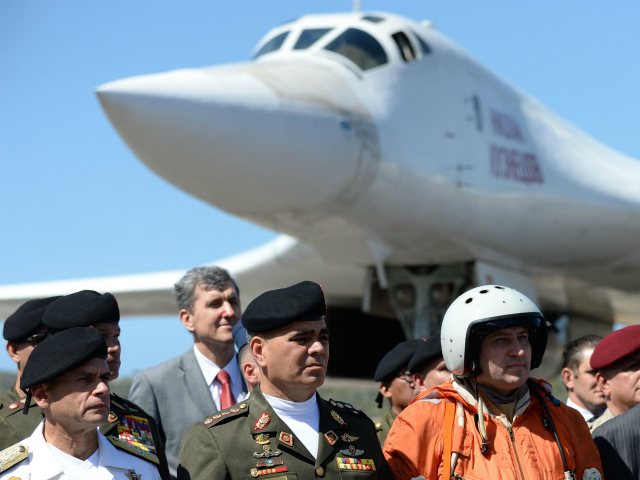Venezuelan news agencies, citing the Russian state outlet TASS, reported on Monday that the socialist dictatorship has agreed to allow Moscow to establish a military base on the island of La Orchila in the Caribbean Sea, the first such base since the end of the Cold War.
La Orchila is about 1,350 miles from Key West, Florida, and less than 1,000 miles from the American military base in Guantánamo Bay, Cuba, offering the Russian military close proximity to the United States.
Venezuela’s NTN24 quoted the Russian news agency stating the Russian government is seeking a base in Venezuela to place military aircraft within reach of key Western Hemisphere locations. The outlet also noted that, in another Russian media outlet, Russian military expert Shamil Garayev claimed that Russia has a need for such a location because, that way, “our strategic bombers do not have to return to Russia every time [after an exercises], and will not need to refuel midair during patrol missions to the Americas.”
TASS reportedly cited another Russian military source, Col. Eduard Rodyukov, who directly linked the establishment of a base in Venezuela to the Trump administration’s decision to withdraw from the 1987 Intermediate-Range Nuclear Forces (INF) Treaty, which limits both Russia and the United States to developing ballistic and cruise missiles with ranges of only up to 3,500 miles. Washington has accused Russia of violating the letter of the treaty on several occasions, while the Russian government has attempted to argue that more modern technology like predator drones serve the same purpose as the weapons the INF treaty bans, thus in a manner violating the treaty.
Last month, National Security Advisor John Bolton traveled to Moscow to alert the Kremlin that President Donald Trump intended to withdraw from the treaty.
“It’s Russian violations of the treaty, in our view, that has gotten us this to this point, and it’s something that’s been going on for five years, if not more,” he said, adding, ““I think they understand our reasons quite clearly, some of which I think they might fully appreciate from their own strategic perspective.”
Rodyukov nonetheless insisted to TASS that withdrawal from the INF treaty required Russia to have a more robust presence in Latin America: “The arrival of Russia’s Tu-160 strategic bombers to Central America is kind of a signal to Trump to make him realize that abandoning nuclear disarmament treaties will have a boomerang effect.”
Russia sent two Tu-160 strategic bombers, nuclear capable aircraft, to Venezuela on a joint mission with the failed socialist state last week.
“During their visit to Venezuela, the pilots of long-range aircraft performed a routine flight in the airspace over the Caribbean Sea,” the Russian Defense Ministry said in a statement, “receiving practical experience of fulfilling the flight task near the equator in the conditions of high humidity and temperature regimes, as well as of performing joint flights with crews of Venezuela’s attack aircraft which accompanied Russian jets at different stages of the route.”
The aircraft withdrew from Venezuela on Saturday and returned home following an outcry from the United States. The Russian government expressed outrage not only at Washington’s objection to their presence in the region but to remarks from U.S. Ambassador to Colombia Kevin Whitaker dismissing the aircraft as “museum exhibits” that American forces can easily intercept if necessary. Defense Ministry Spokesman Major-General Igor Konashenkov issued a statement on Friday stating that the aircraft are “museum pieces … [in the context of] admiring this masterpiece of the domestic engineering thought in the sphere of aircraft-making to the envy of Russia’s ill-wishers.”
Russia’s concerns in the Western Hemisphere do not only extend to the United States. Establishing a base in Venezuela could help Moscow elbow the Chinese government out of the region, which has invested billions in controlling key natural resources in the country. Following a visit to Beijing in September, dictator Nicolás Maduro announced that China had agreed to offer $5 billion in aid in exchange for control of oil assets. Maduro’s regime, facing near-total bankruptcy due to the socialists’ inability to efficiently extract oil from the ground, owes both China and Russia to the tune of billions. With this latest offering, China secured loan payments from Venezuela, often at the cost of the nation paying the Russian loans.
In November, Igor Sechin, the head of the state-run oil company Rosneft, traveled to Venezuela to complain that Caracas had failed to make payments to Moscow while continuing to pay Beijing. Maduro traveled to Moscow shortly after and met with Vladimir Putin, reportedly making the deals necessary for Russia’s new military presence in the country.

COMMENTS
Please let us know if you're having issues with commenting.